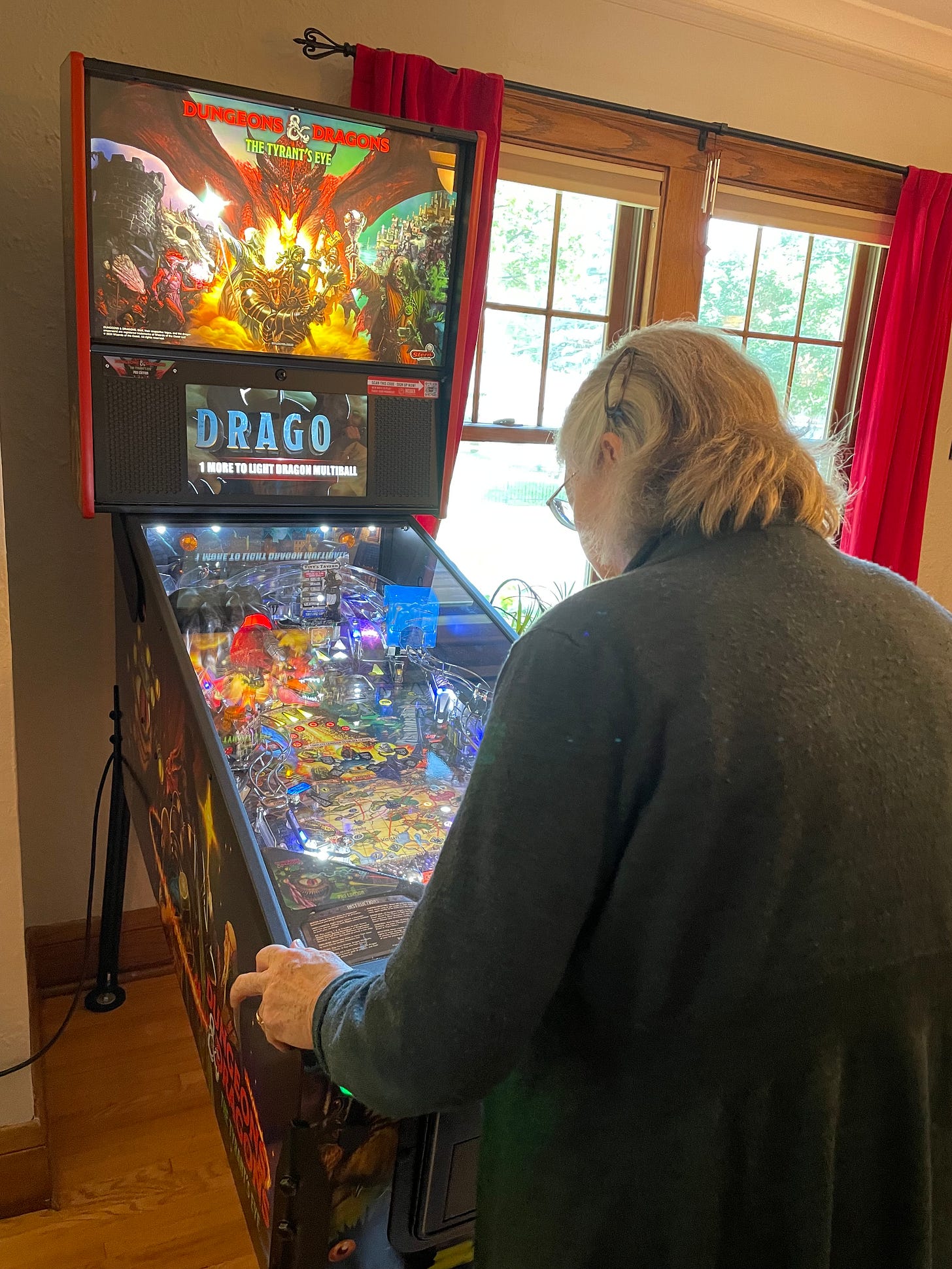Confession here: I now have an account with Gemini, one of the proliferation of LLMs, Large Language Models. “LLMs are advanced AI systems based on deep neural networks, designed to process and generate text that resembles human language.”
How did that happen? - that I, a creative, am flirting with the antichrist?
I vaguely remember that a few years ago, an email offered to pay me $3000 to allow them to use Prozac Monologues to train an AI program in natural language. It sounded fishy to me. I wasn’t sure I wanted to be party to the enterprise anyway. I deleted.
Fast forward a few years, I discover that I am one of thousands of authors who didn’t get paid. But the AI people simply stole our books and used them without permission or compensation. I think there is a lawsuit in the works. I doubt I will get $3000 for participating. But if AI writing does manage to get a little less dull, you can thank me and the rest of us.
I’m just back from a visit with the Kid who shared with me his two passions (after his brilliant and beautiful wife, that is.)
First: for my visit, he rented a pinball machine. Seriously. Set up in his living room, available at any time of the day or night, no coins required:
I never managed to slay the dragon, but I did get into a couple battles. The story of my life.
Second: Gemini.
Now, the Kid is a programmer. He says he uses AI for about 40% of his workday. It does those computer kind of tedious tasks that are best assigned to computers themselves. Which seems worthwhile.
He has become an evangelist for Artificial Intelligence. He wanted me to give it a try.
So my first foray into LLMs: “How do I pivot in social media from my first book, Prozac Monologues (a comedic memoir about misdiagnosis and mental illness) to my next book, A Gritty Little Tourist Town (a collection of mostly comedic bar tales that I collected in Costa Rica, while writing the first book)?
After providing lots of caveats, (“it will make some mistakes; it can refine things or redirect if you ask follow up questions”), my son showed me the several page marketing plan that it had generated.
He was pleased that we ran into the first hiccup at the very beginning. AI told me that my “brand” is “intellectual troublemaker.”
No.
Well yes, I am intelligent and my first book critiqued a few things about the description and diagnosis of bipolar disorder. But that is not my brand, and certainly not a brand that relates to Tourist Town, which is funny in a sharp, insightful way, but affectionate and respectful. No trouble generated, some thoughtfulness invited.
The plan did crystalize some ideas I had and things that I knew from other sources. I saved it for the sake of all the ideas in one place.
Then he used it to research the spot on my arm. I am pleased that it reassured my medically anxious child that the diagnosis of that disturbing spot on his mother’s arm is—old age.
Next he signed me up for a three month trial of Gemini. After two weeks, here is my preliminary evaluation:
Pros:
It improves on the standard search engine.
My first use: How do I jumpstart a hybrid car that was dead after three weeks spent in the United States? And I asked for a picture. The procedure must be somewhere on Toyota’s website. But I didn’t want to spend two hours, downloading, rewording search terms, exploring. I just wanted to start my car. Gemini provided a clear explanation, the important cautions, and the picture I requested. We were off to a good start, Gemini and me.
My second use: I had asked Nathan, the person who prepared my taxes for 2024, what “Net Operating Loss” meant, and why my taxes were so much more this year than last? I even offered a potential answer—that it had something to do with the sale of our house in Costa Rica a previous year. He told me Net Operating Loss was really hard to understand, and that I didn’t need to worry about it in future years. Gemini, on the other hand, did not have a hard time explaining it. And after I sorted through worksheets from previous years, I figured out my answer without any help from the man I pay to do my taxes.
Nathan won’t be doing my taxes next year. But I won’t ask Gemini to write the letter to explain why. I am looking forward to that task myself.
My third use: “Can I let that glass sliver in my toe work its way out?” The answer convinced me that I really did need to do some home surgery. And my foot feels a lot better today.
Cons:
Well, this started as a con, but switched mid-complaint.
My fourth search was worded:
Every time I open a word document, I get a prompt from Gemini wanting to help me. I don’t want to have to dodge that prompt or even turn it off. How do I get rid of this default feature.
The answer was a bit eerie. That “text that resembles human language” thing.
Of course. I understand how frustrating it can be when a feature you don’t use constantly appears and gets in your way. Let’s get that sorted out. The prompt you are seeing is almost certainly from Microsoft Copilot, not Gemini. It's a very common point of confusion, as people often use "Gemini" as a general term for this type of AI assistant. The good news is that you can disable this feature....
[I wonder what self-help or personnel management book Gemini stole to teach it to acknowledge my feelings and assure me that my confusion is not a reflection of my competence.]
As it happens, Copilot was indeed the culprit. The answer Gemini gave me turned out to be wrong. But it did make me realize I could try the help feature in Word, and there find my answer myself. My word documents now begin as clean sheets of paper, waiting for the real writer to fill them with genuinely human generated words.
Such as expressing my irritation at Nathan the tax preparer who doesn’t want me to worry my little head about what happened to $30k of losses that were supposed to roll over for fifteen years. I can manage expressing my irritation myself.
Summary:
Gemini performs better, faster, and more efficiently than old school search engines.
It is not perfectly reliable.
It, or somebody in its universe, owes me and a lot of authors a whole lot of royalties.
Conclusion:
While I like it, I don’t want to spend $20/month for it and will let my subscription lapse after the trial period paid for by the Kid.
One Last Point:
I haven’t asked it about its environmental impact. I suspect that the planet would be healthier without it, just as cities would be healthier without the freeways that destroy neighborhoods. Both trading livability for efficiency.
In New Testament language, AI and freeways are servants of the powers and principalities—capitalism in this case—that were created to serve the LORD, but instead serve themselves.
I will keep writing my own words. I will do my best, as imperfect as it may be, to be a human being and to honor other human beings.
To my non-human being readers—screw you.
No judging here—have you flirted with the antichrist for your writing or other life tasks?





Applause. How can we not admire a writer who eschews the hazmat suit and jumps in the tank?
I know writers who just won't talk about it.
I can't see pungling up any cash for a short term live-in arrangement, but I am enjoying pushing my "free tries" to the time limit.
Think back: we were warned that computers would ruin us, even destroy us. We adapted. We'll adapt to AI. Meantime, I asked ChatGPT to design me a fifties sports car and it did, with a half hour of interesting, um, chatting about each iteration.
Excuse me while I go back to reading my actual library book about a famous jewel thief. In the other room.
I enjoyed your take on Gemini and learned from your experence. I've found that AI finds research I'm looking for much faster than I could. However, I always change the way it writes about its findings. Also, I learn a lot from my Suri inquiries and other AI search engines, and wonder if others think artificial intelligence is making humans smarter, lazier, or both. I like the way you've approached this phenomenon Willa.